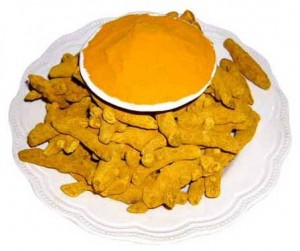Scientists are puzzled over some facts: Why are cancer rates less than half in India as compared to the US? Why is the rate of Alzheimer for people aged 70-79 less than a quarter in India as compared to the US? One suggestion is that the difference is due to the widespread use of Turmeric in India as opposed to the US. Here are five things you want to know about Turmeric:
1. How does it help?
The benefits of Turmeric cast a wide net. It is an antioxidant. It is anti inflammatory. It has anti-biotic and anti-viral properties. It is said to work against different types of cancers (Prostate, breast, skin, and colon). It is said to benefit Alzheimer patients. It reduces blood sugar levels in laboratory mice so it can help diabetics. It can help with indigestion. It may help with arthritis and rheumatoid arthritis. It is said to be a natural liver detoxifier. It has been used in Chinese medicine as an anti-depressant. It has been shown to slow down progression of multiple sclerosis in mice. Because of its excellent anti-inflammatory properties it could also help with allergies, asthma, and bronchitis. It may also have a positive impact on Cardiovascular Diseases. In addition it is supposed to help with inflammatory skin disease. There are even reports that it can help in the treatment of AIDS.
2. What does the Science say?
The biggest rap against Turmeric is that its effects have not been proved in human trials. This is true in most cases, but human trials are expensive and this is to be expected. This is because no big pharmaceutical company is going to throw dollars in proving Turmeric’s benefits as it is not going to be patentable. But there is now 30 years of science supporting most of the claims. There are plenty of in-vitro studies on cells and studies on mice that indicate the benefits listed.
3. What are the downsides?
There are very few downsides of Turmeric. However please note the following: Turmeric should not be consumed by people with Gall bladder disease. It should not be consumed in high doses (More than 8 grams per day) for prolonged periods. It has also been suggested that those on blood thinners may not want to consume Turmeric in high doses and consult their doctors if they still want to do so at lower doses. Those undergoing Chemotherapy should also consult their doctors before consuming Turmeric.
Here is another warning: Please do not use Turmeric as an agent of primary cure. Its role should be better viewed on the preventive side rather than the curative side.
4. How much should I take?
The FDA has declared Curcumin (the active ingredient of Turmeric) as safe. (It is classified as a GRAS, Generally Regarded As Safe.) A daily consumption of 1-2 grams of Turmeric is considered to be safe.
5. How do I take it?
Turmeric is known to have poor bioavailability. This means most of the active ingredient of Turmeric does not get absorbed. This is why Turmeric powder is usually consumed in India along with “Masala powder”. One of the key ingredients of “Masala Powder” (also known as “Garam Masala“) is black and white pepper. The active ingredient of pepper is Piperine. This is known to increase manifold the bioavailability of Turmeric’s active ingredient. So your best bet to consume Turmeric is to take it as a spice along with other spices such as Cumin seed and Masala Powder. The other option is to take it as a supplement. (Most supplements include Piperine along with Turmeric powder in the capsules.) If you use Turmeric in your cooking be sure you do not burn it by cooking it at high temperatures. Instead sprinkle it on top after the cooking is done. If you want to consume Turmeric as a tea, please be sure to add crushed black pepper to the mix.
If Turmeric was a drug produced by a Pharmaceutical company its benefits would have been blasted from every roof top. It is cheap and safe. Incorporating it into your diet is painless. Given the wide range of its potential benefits it may be a great idea to make Turmeric a part of your daily diet.
Related:
Turmeric Research
The Magic Of Chia Seed
Credits:This has been written by Raj Shah and edited by Ketna Shah.

